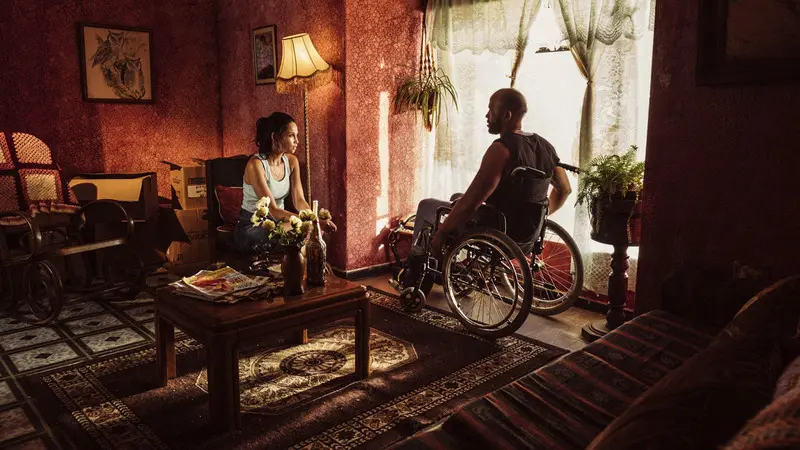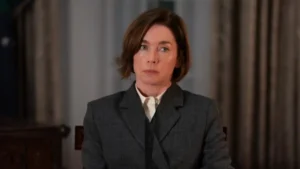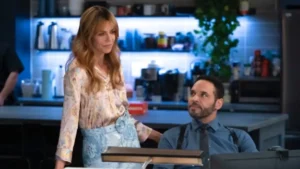Summary
Randal is badly injured, as a result of his debt to his loan shark boss; while recovering, he observes a murder in the opposite apartment block. An extremely tense feature debut from Nosipho Dumisa.
I often don’t see the point of “modern takes” on old films, especially when the film in question is a true classic: have we run out of original stories? So I went into Number 37 with a wary gaze, having heard from the hosts of Mayhem Film Festival, just prior to its UK premiere, that this was a homage to Rear Window.
Just like the original, in which James Stewart was stuck at home recovering with broken legs, we have a man with nothing to do all day… but this time, it’s because of a drug deal gone wrong; and so wrong that his partner lost his life. Just like the original, he kills time gazing out the window at his neighbours… but unlike Jeff in Rear Window, the protagonist of Number 37 is anxiously seeking a solution for his problems while doing so.
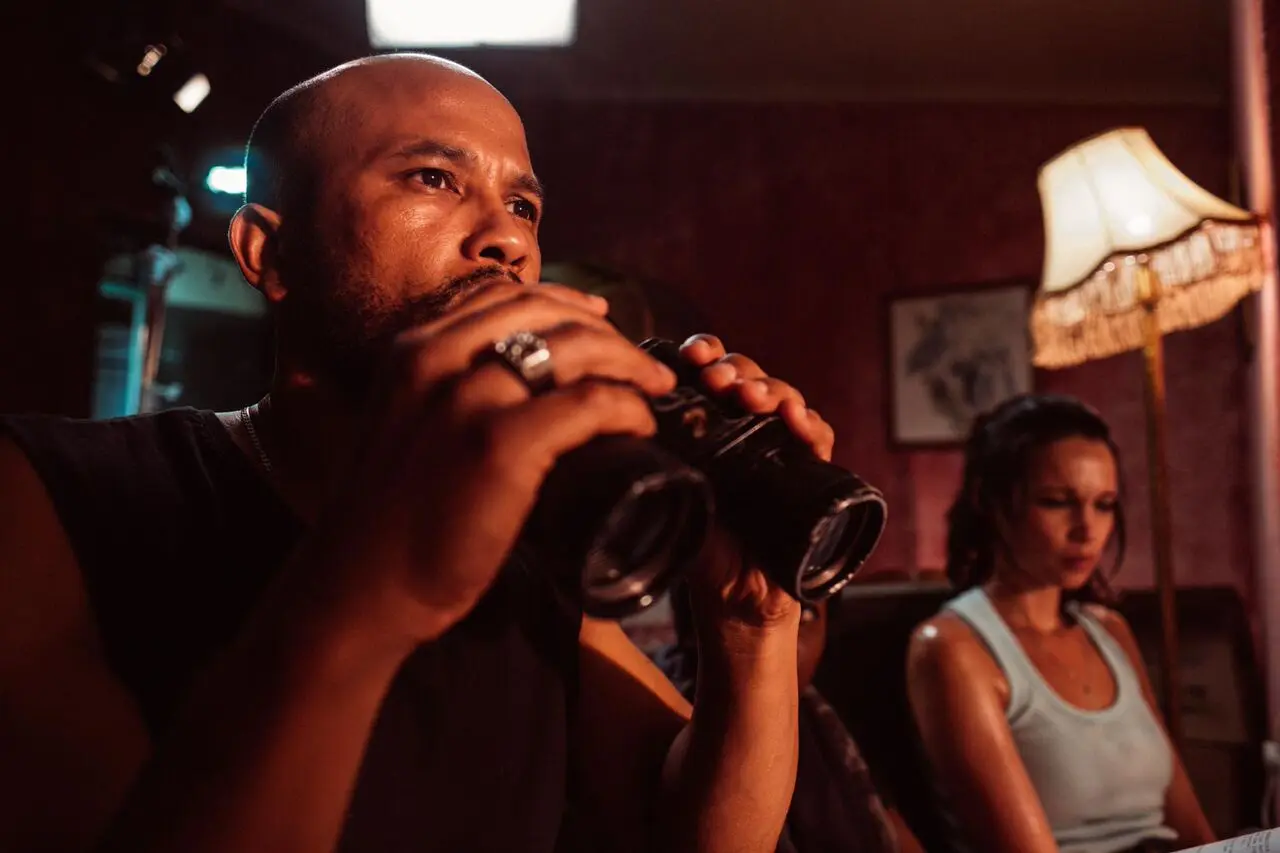 Nosipho Dumisa (who wrote and directed Number 37) may have started off by wondering how she could tell Hitchcock’s story, or how it might work in her city. However, the result is not simply a remake by any means, but a great thriller in its own right, with original characters, a more complex plot than Rear Window and tension you can feel all over.
Nosipho Dumisa (who wrote and directed Number 37) may have started off by wondering how she could tell Hitchcock’s story, or how it might work in her city. However, the result is not simply a remake by any means, but a great thriller in its own right, with original characters, a more complex plot than Rear Window and tension you can feel all over.
Number 37 is set in a fictional ghetto in South Africa (most of the speech is in Afrikaans). It is, therefore, both gritty and colourful, with language and action to match. The majority of the characters are black, and the majority are gangsters or petty crooks, but this does not mean that the plot is about glamorising crime; quite the opposite. These aren’t the rapper gangsters surrounded by women that American films might lead us to expect, but people who happen to live in that world, make of it what they can, and (often) try to do better. They are all human, and although some might look like stereotypes on the surface, they all have real character.
The main character is Randal (Irshaad Ally), who works for loan shark Emmie (Danny Ross); at least until he made the mistake of “investing” some of Emmie’s cash into an unsuccessful drug deal… which is how he ends up in the wheelchair. Emmie has little sympathy; well, just enough to allow Randal seven days to get the money together to give him back. Randal’s girlfriend Pam (Monique Rockman) had no idea of the trouble he had got into; unlike him, she has a “proper” job and therefore expects to support them both while he adjusts, never realising that there was a debt to be paid too. But the two are clearly devoted to each other, and Pam accepts Randal’s mistake, no matter how capable he is of learning from it.
And this is where she goes out to work, leaving him with a gift of binoculars to pass the time… Randal – just like old Jimmy Stewart – smiles at attractive women across the block, sees two sides to some neighbours, and sees tantalising views of life, frustrated that he cannot take part. He also sees, painfully out of reach, what looks like a bag of money, which might solve all his problems. I won’t tell you what happens after that, but things are never going to be as easy as reaching over to no. 37 for a big bag of cash; especially when he finds out whose flat that is. Risk piles on risk upon risk, not only for Randal, but Pam and Randal’s best mate Warren (Ephram Gordon) too. We are talking about an urban ghetto, after all, one which looks and feels realistic, and I’m led to believe is.
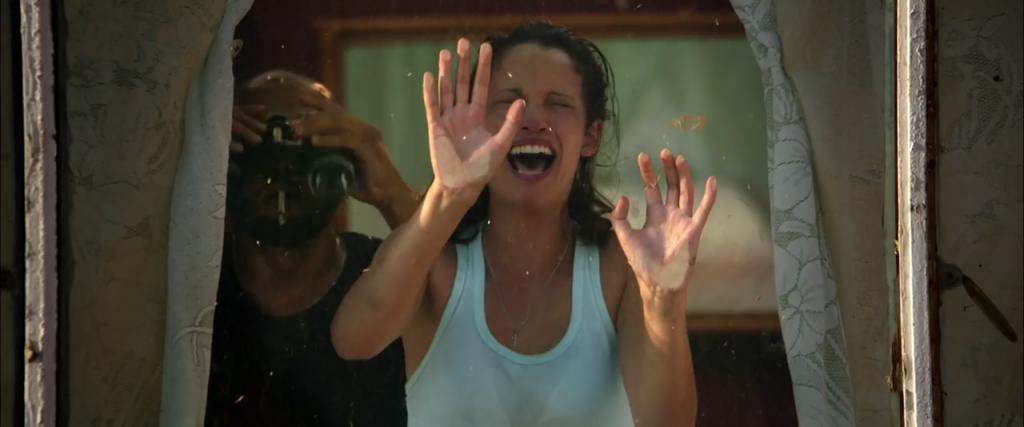 I’ve mentioned the tension already; it comes from the plot I’ve outlined, of course, but is thoroughly reinforced by the quality of the acting; especially on the part of the two leads, neither of whom have played such big parts before. Ally’s Randal is such a sympathetic, fallible man, and we get to know him enough in the first part of the film that we can feel everything he is going through when things get tough. Rockman’s Pam impressed me more, though: funnily enough, she reminded me a little of Irene Cara I watched on TV as a kid; strong without sacrificing femininity or feeling. Her character only shares Randal’s lifestyle to the extent of being his partner; it’s not in her nature to take part in anything criminal. So when she finds herself obliged to engage in cloak and dagger, and expose herself to real danger, the conflict inside her is right there in the look on her face, along with her fear.
I’ve mentioned the tension already; it comes from the plot I’ve outlined, of course, but is thoroughly reinforced by the quality of the acting; especially on the part of the two leads, neither of whom have played such big parts before. Ally’s Randal is such a sympathetic, fallible man, and we get to know him enough in the first part of the film that we can feel everything he is going through when things get tough. Rockman’s Pam impressed me more, though: funnily enough, she reminded me a little of Irene Cara I watched on TV as a kid; strong without sacrificing femininity or feeling. Her character only shares Randal’s lifestyle to the extent of being his partner; it’s not in her nature to take part in anything criminal. So when she finds herself obliged to engage in cloak and dagger, and expose herself to real danger, the conflict inside her is right there in the look on her face, along with her fear.
I’m struggling to think of any flaws, to be honest, as stuck as I was with A Quiet Place. The only obvious one is the stand-out plot device of the binoculars, but so be it: Dumisa doesn’t have any qualms about this being a Hitchcock homage, so let us accept it. That device leads the audience to think they know what to expect from here on, but I can assure you there are surprises and mysteries; to the extent that, by halfway through, I had virtually forgotten about James Stewart and Grace Kelly. This was partly because of the strong sense of place, as well as people, I must say: I could feel the hot, dry air in the streets, and the interior sets were dressed to match their residents.
If the only films you’ve seen from South Africa are District 9 and Blood Diamonds, you owe it to yourself to catch Number 37 for a different view. And if you normally avoid subtitles, trust me: they are both clear and unobtrusive, and a lot more is said with looks and action than words, anyway.
But regardless of the setting or background, Number 37 is bloody good: an exciting, tense thriller, sharply written, and with truly excellent acting. I hope it gets a decent cinema release outside its home country; in the meantime, I feel very privileged to have seen the UK premiere at Mayhem.

